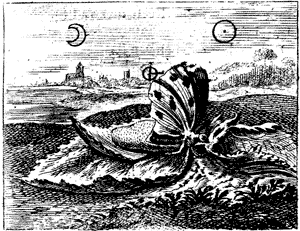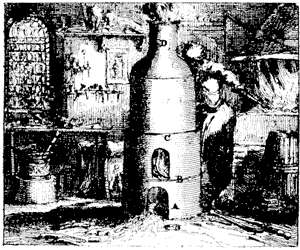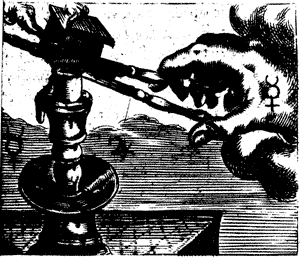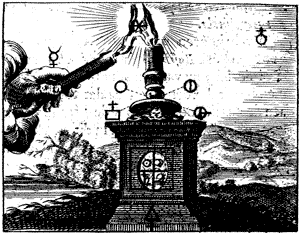
|
|
Alchemy in the 21st. Century. By G. Butuzov 1. The Light of Reason and Dead Butterflies.
As Eugenius Philalethes has justly observed, modern science loves to 'torture matter'. A scientist catches a butterfly, kills it with poison, and then dissects its sexual organs with the tiniest of tools, and - to his utter delight - discovers that this butterfly actually "belongs to an unknown species", not even noticing that the past tense would have been more appropriate in the given circumstances and that this particular specimen might well have been the very last of its kind. Later his delight acquires written form in some learned paper known as a 'scientific text', usually made up of those awkward and voluptuously incomprehensible expressions that now constitute scientific language, a language so lively and picturesque in former times. Even if it so happens that such a scientist has the additional gift of being an artist, he is easily recognizable by the glossy characters of his fictional works dancing in a ring around the chief and only living hero: Artistic Device. Of course, if you try to dissect those characters with a knife, you will find all the necessary organs inside, and even some reddish liquid circulating in the tiny drains. Fluorescent lighting on the stage is the only common link connecting the two abovementioned kinds of text. This is the 'light of reason' so frequently mentioned in the stilted novels of the 18th.century. Greek mind, nous, with all its inclinations toward analysis and atomization, could never even have imagined to what extent it would be developed by its eager descendants who have brought it to the state of ratio, a word that grammatically coincides with the Latin verb to count. These noble accountants of the new science so eagerly plunged into their activity that they have forgotten the very existence of intuition, symbols and imagination, the main tools of the solar and creative aspect of the human mind. Now the dented little moon of rationality has taken on the role of main lighting appliance, correspondingly changing the configuration of shadows. From the second half of the 17th. century on, it is this pallid and inanimate light that has illumined for us the amphitheatre of the universe, cutting deeper and deeper into the texture of reality, dispersing it into atoms, particles and, ultimately, quarks that behave like a hallucinations when being closely scrutinized (they smile and disappear). In general, though, this 'lunar' universe shows not firmer stability. It flies off at speed close to that of light from the 'centre of a great explosion' (which, to my mind, is most likely merely the overworked brain of modern science). One who follows the path of sacred science does not poison and dissect a butterfly. He watches it, thinking about it, and then, stopping all discourses, allows its essence fill him like a vessel. Then, sensing two huge colorful sails behind his back, in that very instant he will understand exactly what a butterfly is and also what that boring fellow quoting Ch'uang-tse was, is and ever will be. If he has the capacity to write, even in the knowledge that no one will believe him or accept his text as a scientific work, he will certainly describe how to become a butterfly in terms that best fit that state, because, for a creative mind, myth is the only true reality and the personally lived-through myth the only thing worth writing.  2. A psychoanalyst in Emperor Rudolph's Court.
It may, however, happen that some pleasant-looking gentleman with a grey moustache, gold watch in his waistcoat pocket and fragrant pipe clamped between his teeth will look into your eyes and assure you with tender voice that he has analyzed the Myth, understood all that's in it, and is ready now to provide you with its 'rational explanation', and, as a supplement, with your own true self - the one you've looked for in vain for years - both together as a job-lot - a prize for the confidence and patience you're going to show him at the time of your possible communication. "How come?" you will ask, amazed. "No ascetics, no meditations, not even Zen-master's stick?" "Of course not," the imposing adept will smile, "nothing of the sort. Please lie down on this couch, and I'll explain it all." Here I must warn you, dear reader, that this considerate and generous old gentleman is in fact the same inquisitor of butterflies, who has simply left his white smock behind the door in order to free you of superfluous suspicion. The moment you lie down and relax, however, a scalpel jumps out of nowhere into his juggler's hand, a scalpel which will serve him henceforth as a tool for researching the structure of your (as you believe) immortal soul. Cutting into its outer integument and finding in the bottom a couple corpses of small dry insects that have flown in from another world, his glasses ablaze, and softly murmuring "Archetype! Archetype!" the gentleman beams with joy. Holding the corpses by their legs and wagging them under your nose, he explains that these remnants are powerful images stored in the cellar of the consciousness of humanity since the beginning of time, and that, if you succeed in 'integrating' your awareness with this herbarium, you will become you own true self, an authentic being, regaining your Selbst (he is definitely fond of capital letters and, consequently, of the German language). "You mean I'll be like Buddha?" you ask, sounding just a trifle naïve. "Almost," the couch-meister will mumble, carefully wiping his glasses. Then, looking mysteriously around the room, he will bend forward and whisper in your ear: "This is the secret of alchemy". "The Philosophers Stone!" you ecstatically exclaim, simultaneously experiencing the delusion of a long row of alchemists in Phrygian hats lying on couches. "Exactly!" the white-moustached magus proclaims, solemnly bringing to a close his séance of revelations. "Tomorrow at the same time, eh?" he says, handing you the insects. You go home racking your brains over the question of how to assimilate these dry mummies into your awareness, and in the days, months and years that follow you will be returning to that familiar couch to listen to fantastic tales told by primordial beings who, 'not knowing the nature of chemical substances, obey the dark forces of their unconscious minds' by means of which they have invented an amazing process for obtaining the Stone of Projection, or Tincture of the Philosophers. In reality, it's simply an encrypted recipe for getting at the blessed Selbst by means of assimilating those 'powerful and dark forces', the which merging will help to fill your feeble mind with so much energy that it will be able, if not to actually turn water into wine, at least to ignore the difference. However, one day you will loose patience and you will rebel. "You've dug a whole pile of garbage, a few lizards and centipedes that you call 'mandalas' and 'ouroboroses' out of my unconscious, but I can't find anything in them that has the effect of suppressing my consciousness, or understand how assimilating these alien remains is supposed to help me to find my true self" "Oh, you're so naïve! exclaims the maître. "You really don't understand the scale that these, as you call them, 'remnants', can assume! It has sometimes happened in my practice that their vastness has exceeded the very consciousness of a patient, their wings totally cutting off all sunlight from him…" As the glasses of the master become white-hot, and his spread arms no longer suffice to describe the scale of yet another 'archetype', you will need to put a stop this verbal waterfall with a simple question: "You say 'patient'. This means we're talking about a person with some mental disorder, doesn't it?" "Hmmm! And who does not have one in our time?" the analyst will muse, suddenly calming down. "But maybe I'm sane?" you will ask, almost horrified. "Yes, it does look like that," the surgeon of the human soul will reply, suddenly loosing interest in the conversation and rather obviously becoming fascinated by the gleaming links of his watch-chain. At the door you will turn back your head and ask one final question: "What about the Philosopher's Stone?" And he, sighing with irritation, will mutter: "Oh, come on! You're an adult after all! It's just a figure of speech…" And if, then, instead of closing the door behind you to mark the end of this period of your life dedicated to fruitless verbiage, you say: "Do you know what Emperor Rudolf did to frauds who boasted of having the secret of the Stone?" you will know by the indignant and hurt set of the wise man's back that he does indeed know this and is very glad that times have changed.  3. Frater C.
On the long and winding road of your search for true Gnosis you will surely meet with an elderly gentleman, lean-looking and rather like an Oxford don except for the gown…. as long as that's not entirely necessary. This gentleman, positive and trustworthy in all respects, will point out to you that you've taken up the task from the wrong end - that you have to start from the small things. "Before you can drive a truck, you have to have a license for driving a car" he points out , quite reasonably. He will also explain that the term 'alchemy' suggest laboratory work, of course, and that fussing around on a couch is certainly not the alchemy understood by medieval adepts, and, in particular, by Paracelsus (this name will be significantly emphasized). "Before working with minerals," he will inform you with a vague air of fatigue, "one has to gain some experience working with less dangerous and tenacious substances - plants, for instance". He will then invite you to a seminar (you had no idea there were seminars dedicated to a subject as mysterious as alchemy, did you?) where you will meet with comrades, kindred spirits, future colleagues - in a word, the cream of hermetic thought in the current eon. From that moment on, your basement (if you have one) will exhale the odors of a cheap perfume factory, and your wife (if you have one) will quietly and persistently destroy the results of numberless distillations that you have put aside for future work and that occupy all free space of the house in your absence. Day by day you will come closer and closer to the obtaining of the plant Stone, or the medicine of the second degree, also known as the 'panacea' which can solve any problem in the living organism. With every new and more subtle quintessence you will feel one step closer to the goal that is so tempting, albeit intermediate, and of course, such trifles as money and time will never be serious obstacles for you. To the almost inaudible sighs of you spouse, with your new friends you will discuss prices of chemical glassware and where to find a few sacks of dried rosemary for the distillation of primum ens. Group visits to picturesque corners of the local countryside will become your only vacation time for years and years (and the only disturbing thing for you, the only hesitation -if any - that you will have within this limited circle of intercourse will be the strange and barely conscious memory of having actually seen the massive, oversized hands of your professor with their long and knotted fingers covered in grey hair many years before). Nonetheless, a day will come when you get really nervous. You'll be thinking to yourself that you've been running on the spot for an already considerable chunk of your life, that no-one does better distillations than you do, but that the cherished panacea is still as far ahead as it was five years ago. You will suddenly recall that originally you were looking for something quite different, for Philosopher's Stone itself… At that moment, your silent musing will be interrupted by an unexpected word from your grey-haired teacher: "So, dear friend! I believe you are now ready for mineral alchemy. Why don't we try the path of antimony? In fact, let's start tomorrow…" and soon heavy lumps of stibnite will be replacing the sacks of herbs in your basement. Any doubts you had will vanish and you will throw yourself into the study of new material with the fresh strength. Along with a small group of the most able students, your practice in the laboratory will be with furnaces and temperatures that are no laughing matter. And, one fine day, you will find that you have come to the moment all the great ones were writing about. You will hear a terrible hissing in the alembic, this will then change for a sound like that of a machine-gun fire, and… next moment the still will explode. Your friend, the one standing next to the device, will choke in the fiery wave and, seizing his throat with one hand, fall unconscious on the floor. As, like a jerky silent movie, one person bends bend over him, another rushes for a fire-extinguisher, and yet another to call an ambulance, your gaze will shift your from the pallid lifeless man on the floor (who will never completely recover from the burning of his lungs) to the hands of the professor standing in the middle of the laboratory with a strange smile on his face. At last you will remember where you first saw hands like these… In a dark bedroom in the dim and distant past of your childhood, the ghost of these shaggy fingers kept you from sleep after you had read E.T.A. Hoffmann's The Sand Man... Doctor Coppelius, inimitable master of optical illusion and mechanical toys, is watching you again with his greenish, glittering eyes…. 4. The snow-white fire of Hermes.
The day will come when you finally lapse into a total despair. You will realize that either the ancient doctrine has always been a lie, or that any meaning it might have had was completely lost long before you were born. You will seem to be surrounded by an army of ghosts - psychoanalysts, Coppeliuses, nuclear physicists, frauds, visionaries and the mentally deranged without number gleaming in it here and there. They circle around you like carrion-crows, ready to tear the poor remaining days of your life to pieces, and, having transformed it into nothing, fly off after fresh prey. You desperately try to rid yourself of them and to save at least some of the years still left you, some sincere affection for your relatives and a few old friends, and you turn to the common and undeservingly forgotten human values You notice how other people's children laugh, playing in the sun, how beautiful your wife's face still is. You try to leave the damp and stuffy basement where you've spent so many years, to come out into fresh air and feel human again, not like the 'smoky moths' of the Crasselame's Alchemical Ode. But the ship of your life has already sprung a leak. Very soon the light of day will be turning into grey twilight, and the acrid waters of despair will slowly fill your chest. A deep and cold indifference masters you. You will forget what you've been seeking for so many years, what you have spent your life on. All regret and disappointment vanish; the names and faces of your colleagues and teachers melt into nonexistence. The word 'God' becomes a senseless combination of sounds, one of the millions with which people stir up the air around them - 'soul', 'salvation', 'eternity'… Only the one word - 'death' - provokes a faint smile from you, a strange riddle: what else in you could be destroyed? What else could make the fact of your 'death' medically proved? Then - one fine day - a dark, resinous wave will swamp your heart completely, and a pitch darkness settle into your chest but you won't know any more whose chest it is.  … And, at that very moment, a strange thing will happen: colorless light, serene and pure, will flow into your face. Your heart will break free and run to meet this ray of unknown light and your throat will drink it down like a man in a desert drinks from a miraculously found well. Slowly ascending higher and higher with every gulp - over the mountains, over the clouds, over the sun - you will and right into the distant source of this light, your eyes wide and unblinking with sacred awe and rapture, just as Theseus gazed upon the shining doorway leading out of the labyrinth, squeezing the thread of Ariadne in his hands… And at some moment then, you'll hear a rustling of wings right by your ear and there will be a dove - strangely familiar - sitting on your shoulder. In her eye you will see the reflection of your joy as she bends her head a little to one side, and you see at last the olive branch in her beak. 
FINIS |